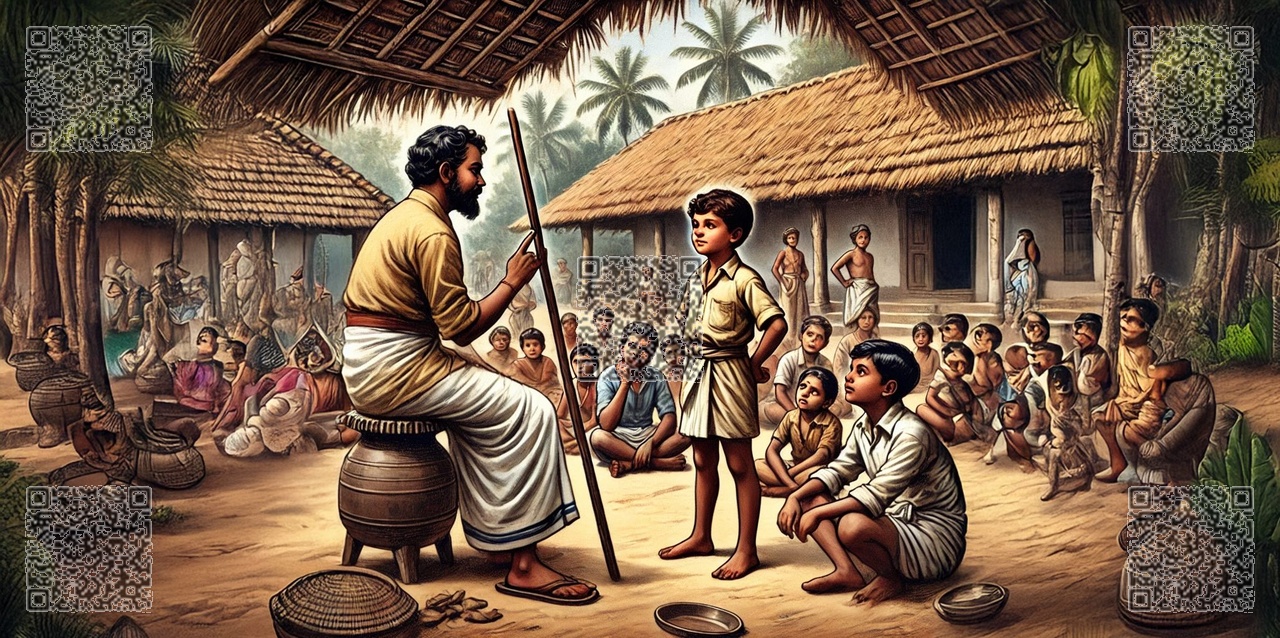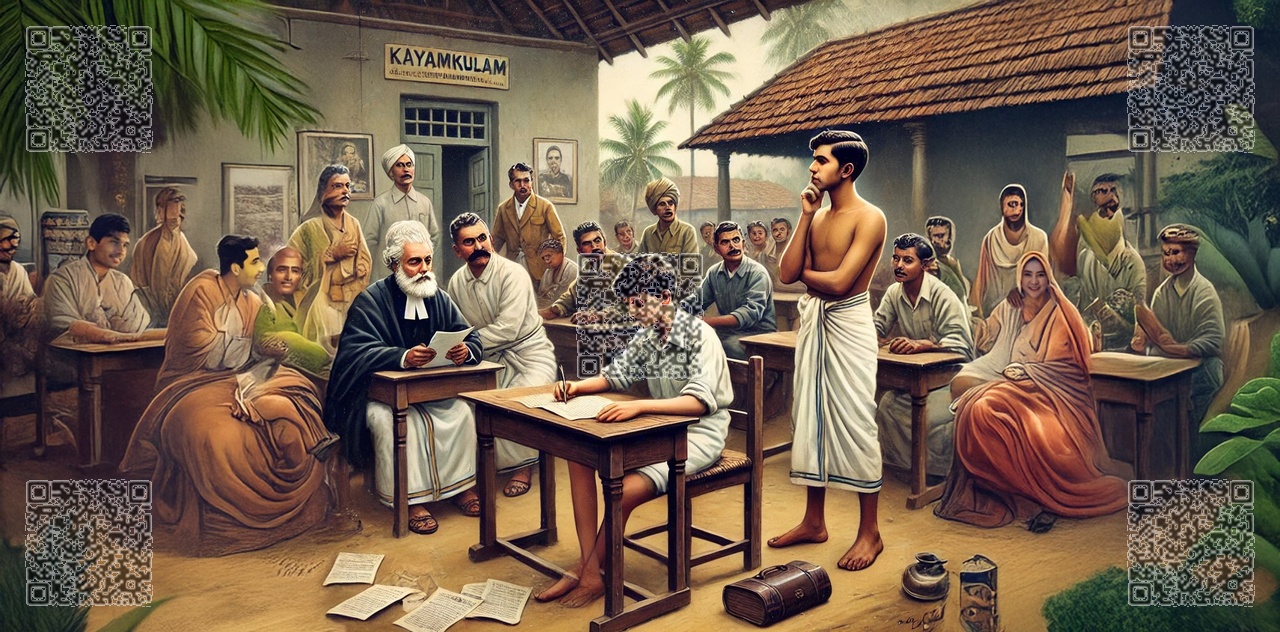Childhood and Early Life
During the early 20th century, Kerala was a land of deep caste discrimination and untouchability. Shri T.K. Madhavan played a key role in transforming Kerala into what it is today. He exhibited intelligence, organizational skills, and political ambition from a young age. His relentless efforts brought the Ezhava community onto the path of social reform and renaissance. Under his leadership, a historically marginalized population denied fundamental rights such as traveling without bounds, education, and temple worship lifted themselves into mainstream society through historical struggles, now etched in golden letters.
T.K. Madhavan was born on September 2, 1885, in a wealthy Ezhava family in Kannamangalam, Mavelikkara, Kerala. His maternal home was Thanniyenkunnel, and his father, Kesavan Channar, was a prominent member of the Aalumoottil family, renowned for its wealth and influence. His mother, Ummini Amma, belonged to the prestigious Komalerathu family. His father was well-known for his medicine, astrology, and law expertise. Madhavan was the second child in the family. His elder sister, Narayani, died at a young age due to illness, and his younger brother, T.K. Padmanabhan, became a teacher. Madhavan grew up at his father’s ancestral home in Cheevacheri, Nangyarkulangara.

Early Education and First Experiences with Discrimination
Madhavan’s journey of resistance began during his early schooling at a local kutipallikkoodam (village school). He studied essential reading and writing under Narayanchil Asan, a teacher who belonged to a high caste. Asan regarded Madhavan as untouchable, reflecting the prevalent caste norms. While he used a stick to hit upper-caste students, he adopted a different method for lower-caste students—throwing the stick at them to avoid physical contact and thus maintain “purity.”
Young Madhavan, then a child of six, could not tolerate such discrimination. Once, when his teacher struck neighbor and companion Govindan with the thrown stick, Madhavan experienced a surge of moral anger and declared his desire for equality. Madhavan later wrote about this incident: “I grabbed the teacher’s writing tool and demanded my palm leaf, asserting my rights with childlike defiance.” After this confrontation, he left the school. Despite continuing his education later, this incident left a lasting impression on him.

Madhavan then enrolled in another school run by Karippuzha Asan, a Christian teacher located 1.5 kilometers away. However, on his way to this school, he had to avoid members of the Nair community, who would punish him for violating caste norms. Even at this school, Madhavan was disturbed by Karippuzha Asan’s discriminatory practice of throwing sticks at him rather than touching him. He studied here for about a year before moving on to learn Sanskrit under Kochukunj Asan at Mavelikkara. Later, he learned English under advocate P. Subramanya Pillai at Nangyarkulangara. This classroom was Madhavan first experienced a gathering where Ezhava, Nair, and Christian students sat together on the same bench. However, even in this setting, teachers followed the practice of hitting students from marginalized communities with sticks to avoid physical contact.
This period was formative for Madhavan’s critical thinking. The caste-based inequality he observed and experienced fueled his inner fire for social reform. His mind remained restless, unable to accept the social injustices around him.
Higher Education and Setbacks
Madhavan later joined the Kayamkulam Government School, where he further developed his proficiency in English. He helped his father translate legal documents from English to Malayalam, showcasing his linguistic skills. However, he and other Ezhava students faced ridicule and discriminatory treatment from their higher-caste classmates and local villagers, which deeply hurt him.
After completing his third form, Madhavan moved to Trivandrum Royal School for further studies. Despite his love for learning, he had to discontinue his education at the age of 17 after the death of his father and the worsening of his tuberculosis. Although he could not complete his formal education, Madhavan gained deep knowledge in various subjects and became an eloquent speaker in both Malayalam and English.
Early Activism and Personal Life
Even during his student years, Madhavan was active in public affairs. He and his classmates formed an organization to address social issues. In 1906, he spent a year seeking treatment for tuberculosis but did not recover fully. In 1907, he married Narayani Amma, his childhood companion from Cheppad’s Kottur Kayyalakkal family.
Social Reform and Leadership
T.K. Madhavan emerged as a fearless reformer, skilled organizer, and equality advocate. Despite belonging to a wealthy Ezhava family, he experienced the humiliation of untouchability firsthand, which fueled his determination to fight against social evils. His ability to organize regional struggles against caste discrimination and integrate them into national movements with the support of the Indian National Congress was revolutionary.
Interestingly, the Indian National Congress and Madhavan, the revolutionary leader, were born in 1885. While the Congress became a national political movement, Madhavan symbolized a tremendous social revolution. His courage, organizational expertise, and unwavering sense of justice made him one of the most remarkable social reformers of his time.
ബാല്യകാലവും ജീവിതരേഖയും
ഇരുപതാം നൂറ്റാണ്ടിൻ്റെ ആദ്യഘട്ടത്തിൽ അയിത്തത്തിൻ്റെയും തൊട്ടുകൂടായ്മയുടെയും വിളനിലമായിരുന്ന കേരളത്തെ ഇന്നത്തെ നിലയിലെത്തിച്ചതിൽ പ്രഥമസ്ഥാനീയനായിരുന്നു ശ്രീ ടി. കെ. മാധവൻ.ചെറുപ്പത്തിൽ തന്നെ നല്ല ബുദ്ധിശക്തിയും സംഘടനാസാമർത്ഥ്യവും രാഷ്ട്രീയലക്ഷ്യവുമുണ്ടായിരുന്ന അദ്ദേഹത്തിൻ്റെ പരിശ്രമഫലമായി ഈഴവ സമൂഹം നവോത്ഥാനത്തിൻ്റെ പാതയിലേക്ക് വന്നു.പിന്നാക്ക ജാതിയിൽപ്പെട്ടതിനാൽ വഴി നടക്കാനും, സ്കൂൾ പഠനത്തിനും, ക്ഷേത്ര ആരാധനയ്ക്കും അവകാശം നിഷേധിക്കപ്പെട്ട വലിയൊരു ജനസമൂഹത്തെ മുഖ്യധാരയിലേക്ക് ഉയർത്താൻ ടി. കെ. മാധവൻ്റെ നേതൃത്വത്തിൽ നടന്ന ഐതിഹാസിക സമരം തങ്കലിപികളിൽ രേഖപ്പെടുത്തിയിട്ടുള്ളതാണ്.
1885 സെപ്റ്റംബർ 2-ന് കേരളത്തിൽ മാവേലിക്കര കണ്ണമംഗലത്ത് ഒരു ധനിക ഈഴവ കുടുംബത്തിലാണ് അദ്ദേഹം ജനിച്ചത്.താന്നിയേങ്കുന്നേൽ എന്ന മാതൃഗൃഹത്തിലായിരുന്നു ജനനം.പിതാവ് ധനസമൃദ്ധികൊണ്ടും പ്രാബല്യം കൊണ്ടും പ്രസിദ്ധമായ ആലുംമൂട്ടിൽ കൂടുംബാംഗമായ കേശവൻ ചാന്നാർ ആയിരുന്നു.അമ്മ ഉമ്മിണി അമ്മ, സുപ്രസിദ്ധമായ കോമലേഴത്തു കുടുംബത്തിലെ അംഗമായിരുന്നു.അച്ഛൻ വൈദ്യം ,ജ്യോതിഷം, വ്യവഹാരം എന്നീ മേഖലകളിൽ പ്രശസ്തനായിരുന്നു.മാധവൻ രണ്ടാമത്തെ സന്താനമായിരുന്നു.ഒരു ജ്യേഷ്ഠത്തി (നാരായണി) കൗമാര പ്രായത്തിൽ തന്നെ അസുഖം മൂലം മരിച്ചുപോയി.അനിയൻ ടി.കെ. പത്മനാഭൻ അദ്ധ്യാപകനായിത്തീർന്നു.ബാല്യത്തിൽ നങ്ങ്യാർകുളങ്ങരയിലുള്ള പിതൃഗൃഹമായ ചീവച്ചേരിയിലാണ് അദ്ദേഹം വളർന്നത്.
കുടിപ്പള്ളിക്കൂടത്തിലെ പഠനകാലത്താണ് ടി .കെ .മാധവൻ്റെ പ്രക്ഷോഭ ജീവിതത്തിലെ ആദ്യ കനലെരിഞ്ഞത് .നിലത്തെഴുത്തും എഞ്ചുവടിയും പഠിക്കുന്ന കാലത്തു ജാത്യാഭിമാനിയായ നരിയിഞ്ചിൽ ആശാൻ്റെ കുടിപ്പള്ളിക്കൂടത്തിലായിരുന്നു ടി.കെ.മാധവൻ എന്ന വിപ്ലവജ്വാല കത്തിത്തുടങ്ങുന്നത്.ഉയർന്ന ജാതിയിൽപ്പെട്ട ആശാന് അന്ന് മാധവൻ തൊട്ടുകൂടാത്തവൻ ആയിരുന്നു.സവർണ്ണ വിദ്യാർത്ഥികളെ വടികൊണ്ട് തൊട്ടടിക്കുന്ന ആശാൻ കീഴ്ജാതിക്കാരായ വിദ്യാർത്ഥികളെ അടിക്കാൻ മറ്റൊരു സൂത്രമാണ് സ്വീകരിച്ചിരുന്നത്.അവരെ പ്രത്യേക രീതിയിൽ വടികൊണ്ട് എറിഞ്ഞടിക്കുക.തൊട്ട് അശുദ്ധമാക്കാതിരിക്കാനുള്ള ഒരു മുൻകരുതൽ.ഇത് പതിവായപ്പോൾ ആ ബാലന് സഹിച്ചില്ല.ആറു വയസ്സ് വരെ അദ്ദേഹം ഈ ആശാൻ്റെ കീഴിൽ വിദ്യ അഭ്യസിച്ചു.അയൽവാസിയും സന്തതസഹചാരിയുമായ ഗോവിന്ദനെ തൊട്ടടിച്ച നരിയിഞ്ചിൽ ആശാൻ തന്നെ എറിഞ്ഞടിച്ചപ്പോൾ ഉണ്ടായ ധാർമിക രോഷം മാധവനിലെ അവകാശ സമത്വ തൃഷ്ണ ജ്വലിപ്പിച്ചു.”ആശാൻ്റെ എഴുത്തങ്ങ് എടുത്തോ, എൻ്റെ ഓല ഇങ്ങു തന്നേക്കു “ എന്ന് ബാല്യ സഹജമായ വൈരാഗ്യത്തോടു കൂടി തർക്കുത്തരം പറഞ്ഞു എന്ന് അദ്ദേഹം എഴുതിയിട്ടുണ്ട്.അത്രയും പറഞ്ഞു പള്ളിക്കൂടത്തിൻ്റെ പടിയിറങ്ങി.തുടർപഠനം നടത്തിയെങ്കിലും വിപ്ലവ വീര്യം കനലായി മനസ്സിൽ അണയാതെ കിടന്നു.അദ്ദേഹം പിന്നീട് ഒന്നര കിലോമീറ്റർ അകലെയുള്ള നസ്രാണി ആശാനായ കരിപ്പുഴ ആശാൻ നടത്തിയിരുന്ന പള്ളിക്കൂടത്തിൽ ചേർന്നു.ഈ പള്ളിക്കൂടത്തിലേയ്ക്ക് പോകുന്ന വഴിക്ക് നായർ വിഭാഗത്തിൽ പെട്ടവരെ കാണാനിടയായാൽ വഴി മാറി നടക്കേണ്ടതുണ്ടായിരുന്നു.അറിയാതെ അവരുടെ മുന്നിൽ പെട്ടാൽ അവർ ശിക്ഷിക്കുമായിരുന്നു.എന്നാൽ കരിപ്പുഴ ആശാനും അദ്ദേഹത്തെ എറിഞ്ഞടിക്കുന്നത് അദ്ദേഹത്തിന് മനസ്സിന് വിഷമമുണ്ടാക്കിയിരുന്നു.ഒരു വർഷത്തോളം അവിടെ പഠിച്ച ശേഷം അദ്ദേഹം മാവേലിക്കര ഈരേഴക്കാരൻ കൊച്ചുകുഞ്ഞാശാൻ എന്ന കണിയാരുടെ കീഴിൽ സംസ്കൃതം അഭ്യസിച്ചു.പിന്നീട് നങ്ങ്യാർകുളങ്ങര കോച്ചാരിയറ്റ് പി.സുബ്രമണ്യം പിള്ള എന്ന വക്കീലിൻ്റെ കീഴിൽ ഇംഗ്ലീഷ് പഠിക്കുകയും ചെയ്തു.അന്ന് ഈഴവർക്ക് ഇംഗ്ലീഷ് വിദ്യാഭ്യാസത്തിന് പല പ്രതിബന്ധങ്ങളും എതിർപ്പുകളും ഉണ്ടായിരുന്നു.ഇദ്ദേഹത്തിൻ്റെ കീഴിൽ പഠിക്കുമ്പോഴാണ് ഈഴവൻ, നായർ, നസ്രാണി എന്നീ വിഭാഗത്തിലെ വിദ്യാർത്ഥികൾ ഒരുമിച്ച് ഒരു ബെഞ്ചിൽ ഇരുന്ന് ആദ്യമായി പഠിക്കുന്നത്.അദ്ധ്യാപകർ കുട്ടികളെ തൊട്ടടിക്കുകയും ചെയ്തിരുന്നു.ഇത് അദ്ദേഹത്തിന് ഒരു പ്രത്യേക അനുഭവമായിരുന്നു.ഈ കാലത്താണ് അദ്ദേഹത്തിൻ്റെ ആലോചനാ ശക്തിക്ക് വികാസം പ്രാപിച്ചത്.കേരളത്തിലെ സാമൂഹികമായ ഉച്ചനീചത്വങ്ങൾ അവസാനിപ്പിക്കാൻ തുടക്കമിട്ട പ്രാദേശിക സമരങ്ങളെ ഇന്ത്യൻ നാഷണൽ കോൺഗ്രസിൻ്റെ സഹായത്തോടെ ദേശീയ പ്രക്ഷോഭമാക്കി വളർത്തിയെടുത്തതും ആ മനസ്സിൽ അണയാതെ കിടന്ന തീ കനലുകളാണ്.
പിന്നീട് അദ്ദേഹം കായംകുളം സർക്കാർ വിദ്യാലയത്തിൽ ചേർന്നു.അക്കാലങ്ങളിൽ അദ്ദേഹത്തിൻ്റെ ഇംഗ്ലീഷ് ഭാഷാ പ്രാവീണ്യം നല്ല രീതിയിൽ വികസിച്ചിരുന്നു.അദ്ദേഹത്തിൻ്റെ പിതാവിൻ്റെ കോടതി വ്യവഹാരങ്ങളിൽ ചിലത് മലയാളത്തിലേയ്ക്ക് തർജ്ജിമ ചെയ്തു കൊടുക്കാൻ അദ്ദേഹത്തിന് സാധിച്ചിരുന്നു.എന്നാൽ ഈ വിദ്യാലയങ്ങളിലെ ഉയർന്ന ജാതിക്കാരായ സഹപാഠികളിൽ നിന്നും ,പോകുന്ന വഴിക്കുള്ള നാട്ടുകാരിൽ നിന്നും ,ജാതി സംബന്ധമായി താഴ്ത്തിക്കെട്ടുന്ന തരത്തിൽ ഉള്ള പരിഹാസങ്ങൾക്കും മറ്റും, മാധവനും അതേ ജാതിയിലുള്ളവർക്കും ഏൽക്കേണ്ടിവന്നത് അദ്ദേഹത്തിൻ്റെ മനസ്സിന് മുറിവേൽപിച്ചിരുന്നു.കായംകുളത്തു നിന്നും മൂന്നാം ഫാറം ജയിച്ചതിനു ശേഷം ഉപരിപഠനത്തിനായി ടി.കെ .മാധവൻ തിരുവനന്തപുരത്ത് രാജകീയ വിദ്യാലയത്തിൽ ചേർന്നു.പഠനത്തിൽ താല്പര്യം ഏറെ ഉണ്ടായിരുന്നെങ്കിലും 17 വയസ്സുള്ളപ്പോൾ അച്ഛൻ മരിച്ചു പോയതുമൂലവും അദ്ദേഹത്തെ വളരെ നാളായി അലട്ടിയിരുന്ന കാസ രോഗം മൂർച്ഛിച്ചതിനാലും അദ്ദേഹത്തിന് ഹൈസ്കുൾ വിദ്യാഭ്യാസം പൂർത്തിയാക്കാൻ കഴിഞ്ഞില്ല.പിന്നീട് വിവിധ വിഷയങ്ങളിൽ പാണ്ഡിത്യം നേടി.അക്കാലത്തെ ഏറെ പ്രശസ്തവും സമ്പന്നവുമായ ഈഴവ കുടുംബാംഗമായിരുന്നുവെങ്കിലും അയിത്തത്തിൻ്റെ ഹീനമായ വേർതിരിവുകൾ മാധവനും അനുഭവിക്കേണ്ടി വന്നു.വിട്ടുമാറാത്ത കാസാരോഗം മൂലം പഠന കാര്യത്തിൽ ഉദ്ദേശിച്ച പോലെ മുന്നോട്ട് പോകാനായില്ല.എങ്കിലും വിജ്ഞാനത്തിൻ്റെ സമസ്ത മേഖലകളിലും അവഗാഹം നേടി.മലയാളത്തിലും ഇംഗ്ലീഷിലും ആകർഷകമായി പ്രസംഗിക്കാനും അദ്ദേഹം കഴിവ് നേടി.പഠനകാലത്ത് തന്നെ പൊതുപ്രവർത്തനത്തിൽ തല്പരനായ അദ്ദേഹം സഹപാഠികൾക്കൊപ്പം ചേർന്ന് ഒരു സംഘടന രൂപവൽക്കരിച്ചു.1906ൽ കാസരോഗശമനത്തിനായി അദ്ദേഹം ഒരു വർഷം ചിലവഴിച്ചു എങ്കിലും പരിപൂർണ്ണമായും ഭേദമായില്ല.1907-ൽ അദ്ദേഹം വിവാഹിതനായി.അദ്ദേഹത്തിൻ്റെ ബാല്യകാല സഖിയായിരുന്ന ചേപ്പാട്ട് കോട്ടൂർ കയ്യാലയ്ക്കൽ നാരായണി അമ്മയായിരുന്നു ഭാര്യ.
അസാമാന്യ ധൈര്യവും സംഘടനാവൈദഗ്ദ്ധ്യവും ഉദ്ദേശ്യശുദ്ധിയുമുള്ള നവോത്ഥാന നായകനും സാമൂഹിക പരിഷ്കർത്താവുമായിരുന്നു ദേശാഭിമാനി ടി. കെ. മാധവൻ.ദേശീയ പ്രസ്ഥാനമായ ഇന്ത്യൻ നാഷണൽ കോൺഗ്രസും ടി. കെ. മാധവൻ എന്ന വിപ്ലവ നക്ഷത്രവും 1885 ൽ ആണ് ജനിച്ചത് എന്നത് യാദൃശ്ചികമാകാം.കോൺഗ്രസ് ഒരു ദേശീയ പ്രസ്ഥാനം ആയിരുന്നെങ്കിൽ ശ്രീ.ടി.കെ.മാധവൻ ഒരു മഹാപ്രസ്ഥാനമായിരുന്നു.



